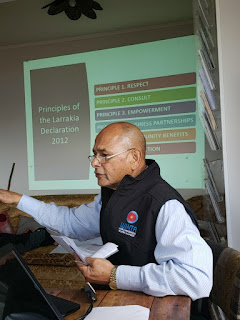For my international placement, I reached
out to and arranged to work with World Indigenous Tourism Alliance (WINTA),
under the direct supervision of Johnny Edmonds, the Director of WINTA. This 3-month placement based in Wellington,
Aotearoa, New Zealand allowed me an
incredible opportunity to learn both about the Maori people, their culture, and
WINTA. WINTA has a mandate to engage in Indigenous tourism advocacy,
facilitation and networking activities as recognised by the World Tourism
Organization (UNWTO) in its endorsement of the 2012 Larrakia Declaration. I was tasked to work on three major
projects: Facilitating Kapiti Island Community Workshop, organizing a Seminar
on WINTA’s rights-based Indigenous Tourism Engagement Framework (ITEF) &
Reviewing WINTA’s Training Collateral.
 |
| Henok and Johnny Edmonds at work workshop planning |
The Kapiti Island whanau (family) workshop
was titled: The practices we want tour/travel operators to follow when engaging
with us. The workshop aimed at creating
a platform that could enable the whanau to collectively share and discuss their
expectations of the practices tour and travel operators need to follow when
engaging with them. In preparing for the workshop one thing stood out to me was
the process of framing and positioning the workshop in a way that affirms the
communities’ engagement right from the outset. As my supervisor says “we are
not selling something to them. It is the communities’ workshop. WINTA’s role is
to facilitate.” We aimed to make sure all activities, presentations and forms
align with what the whanau was looking for and we provided progress updates. I
found the whole process an exemplary approach by an international organization
who considers its obligation to allow the community to guide all elements of
the project.
Kapiti Island is about 5km off the west
coast of the southern part of the North Island of New Zealand. Part of this
Island is a government natural reserve and “of the total 1965 hectares, the
local tangata whenua (Maori people of the land) together kept 13 hectares
around Waiorua Bay, and this is where the Lodge is today”
(https://www.kapitiisland.com). Our team was privileged to visit the island and
the lodge. In order to minimise the risk of insects like Argentine ants and
pests spreading to Kapiti island, the whanau does biosecurity checks before
boarding the boat to the island. Everyone, including whanau members, are
required to clean footwear to remove soil, seeds and diseases. This is an exemplary practice of communities
safeguarding the land. All are required
to respect the protocols, including what to bring and not to bring to the
Island.
 |
| Henok on Kapiti Island |
Being part of this project I learned some
Maori cultural protocols, including Mihi Whakatau. A mihi whakatau, according
to my host supervisor, is a speech of welcome performed by the Kaumātua or
kaiārahi to the visiting group and is sometimes followed by a waiata (song). It
can be responded to from someone in the visiting group in the appropriate
manner, but does not necessarily need to be responded to. Before we entered the
lodge, the whanau performed the mihi whakatau followed by waiata . As we faced each other (visitors on one side and the whanau on opposite), a beautiful Maori song was sung. Another person
and I responded from the visitors’ side. I responded in my first language (Afaan Oromoo), starting with a greeting, then acknowledged the Mana Whenua (people of the land), the E Nga
Mate (Ancestors) and the Papatuanuku (mother earth) and finally I expressed my
gratitude for being there. I wore my own cultural dress and shared a
little bit of my culture. I also sang a waiata, that I practiced beforehand,
with the rest of our visitor group.
On completion of our whaikōrero (speech)
and waiata, we went around and did the Hongi / Harirū. It is the act of
pressing noses, sniffing and shaking hands. My supervisor taught me that it
brings both visitor and host together as one. It is so powerful in making one
feel welcome. What I felt after that was really like being with family, and
among people who love you and care for you. It gave me closeness and openness
with many of them afterwards. I think the whole welcoming process created a
relationship among all of us that made the workshop very engaging. For me
personally, it also connected me to the Maori culture and tradition.
 |
| Henok facilitating Kapiti Island Whanau Workshop |
The workshop project was very important not
only because of its potential value for the whanau, but also because WINTA
wishes to create opportunities to further improve future delivery to other
Indigenous communities and tourism businesses. Analysis and interpretation of
participants’ feedback was undertaken from evaluation forms and through the
traditional poroporoaki protocol where anyone can speak at the end of the
workshop. It is the communities’ way of stating how the gathering went. The evaluation process helped knowing what we could have done better, both for
the whanau and WINTA’s benefit.
 |
| Johnny Edmonds |
These lessons have been carried on for the
other major seminar project I took part in and I invite you to read my second
blog titled ‘A placement that made me feel like I belonged’.

No comments:
Post a Comment